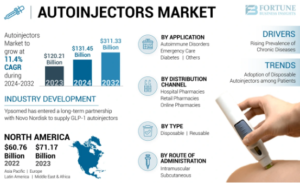The global autoinjectors market was valued at USD 120.21 billion in 2023 and is projected to grow from USD 131.45 billion in 2024 to USD 311.33 billion by 2032, registering a CAGR of 11.4% during the forecast period. North America led the autoinjectors market in 2024, accounting for a dominant market share of 59.2%.
The global autoinjectors market is experiencing notable growth, fueled by increasing demand for convenient and safe self-administration of medications. Autoinjectors—designed for rapid and accurate delivery of drugs like insulin, epinephrine, biologics, and other injectables—are gaining traction in both chronic disease management and emergency care. Technological improvements, such as improved ergonomic design, needle-hidden mechanisms, and dose tracking features, are enhancing patient adherence and safety. Rising prevalence of conditions like diabetes, allergies, and autoimmune disorders, along with expanding home healthcare trends, are driving wider adoption. Additionally, supportive regulatory frameworks, ongoing healthcare digitization, and growing patient preference for at-home treatments further position the Autoinjectors Market as a critical component of modern drug delivery systems worldwide.
Continue reading for more details:
https://www.fortunebusinessinsights.com/autoinjectors-market-108507
Autoinjectors Market Overview
The autoinjectors market is experiencing significant growth, driven by the rising prevalence of chronic diseases such as diabetes, rheumatoid arthritis, and multiple sclerosis. The increasing demand for self-administration of medications, coupled with advancements in drug delivery technologies, is propelling the expansion of the autoinjectors market. Additionally, the convenience and ease of use offered by autoinjectors are encouraging their adoption among patients and healthcare providers alike.
Market Segmentation
The autoinjectors market is segmented based on type, application, route of administration, end-user, and region:
- By Type: The market is divided into disposable and reusable autoinjectors. Disposable autoinjectors are preferred for their single-use convenience and reduced risk of contamination, while reusable autoinjectors offer cost-effectiveness and environmental benefits.
- By Application: Key applications include rheumatoid arthritis, diabetes, multiple sclerosis, anaphylaxis, and other therapies. The management of chronic conditions like rheumatoid arthritis and diabetes significantly contributes to market demand.
- By Route of Administration: Autoinjectors are primarily used for subcutaneous and intramuscular injections. Subcutaneous administration is favored for its ease and patient comfort, especially in home care settings.
- By End-User: The market caters to hospitals & clinics, home care settings, and ambulatory surgical centers. The home care segment is expanding rapidly due to the growing trend of self-administration and home-based healthcare.
List of Key Autoinjectors Companies Profiled:
- Viatris Inc. (U.S.)
- Teva Pharmaceuticals, Inc. (Netherlands)
- Ypsomed AG (Switzerland)
- Recipharm AB (Sweden)
- Becton Dickinson and Company (U.S.)
- Halozyme, Inc. (U.S.)
- AstraZeneca (U.K.)
- Bristol-Myers Squibb (U.S.)
- Phillips-Medisize (U.S.)
- SHL Medical AG (Switzerland)
- Xeris Pharmaceuticals, Inc. (U.S.)

Restraining Factors
Despite the positive outlook, the autoinjectors market faces certain challenges:
- High Costs: The expense associated with autoinjectors can be a barrier, particularly in developing regions where affordability is a concern.
- User Errors: Some patients may experience difficulties in using autoinjectors correctly, leading to potential treatment failures or adverse effects.
- Alternative Drug Delivery Methods: The emergence of alternative delivery systems, such as prefilled syringes and wearable injectors, may pose competition to traditional autoinjectors.
Regional Analysis
- North America: This region holds a significant share of the autoinjectors market, attributed to advanced healthcare infrastructure, high prevalence of chronic diseases, and strong presence of key market players.
- Europe: Europe follows closely, with increasing adoption of biologics and biosimilars, supportive regulatory frameworks, and a growing geriatric population contributing to market growth.
- Asia Pacific: The region is anticipated to witness the fastest growth, driven by rising healthcare expenditure, increasing awareness of self-administration, and expanding access to healthcare services.
- Latin America and Middle East & Africa: These regions are experiencing gradual growth in the autoinjectors market, supported by improving healthcare infrastructure and growing awareness of chronic disease management.
Key Industry Developments:
In May 2023, Boehringer Ingelheim International GmbH announced that the U.S. FDA approved the Cyltezo Pen, an autoinjector for Cyltezo (adalimumab), which is an FDA-approved interchangeable biosimilar to Humira.